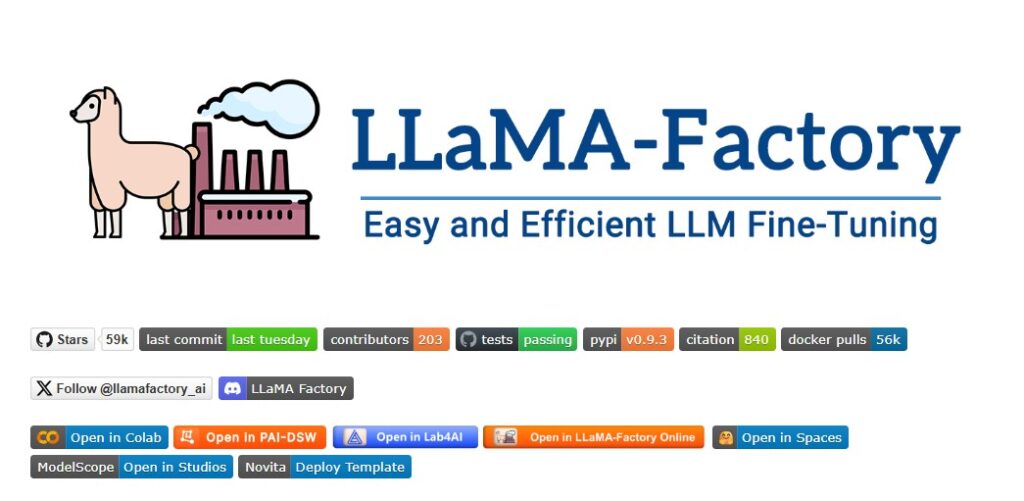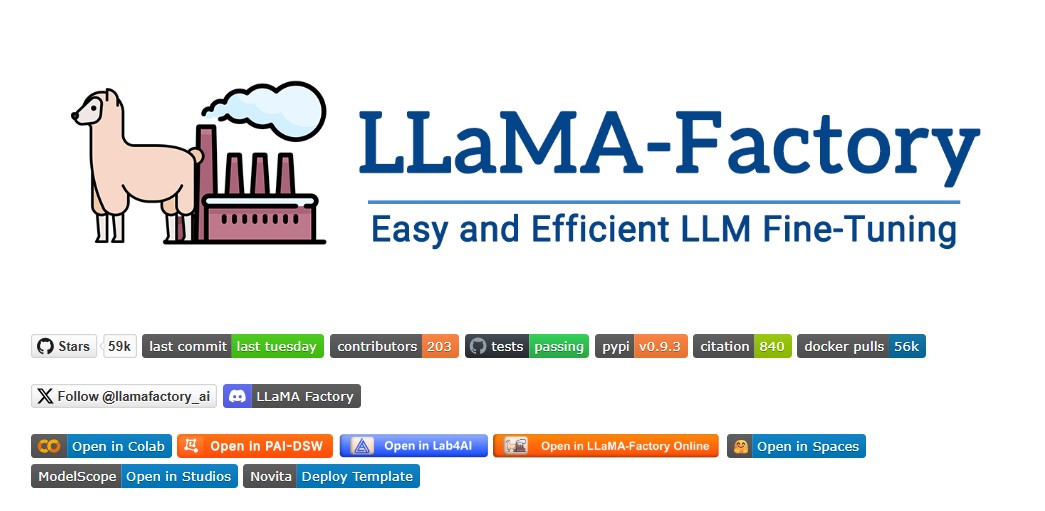Artificial Intelligence (AI) is advancing at an incredible pace, with large language models (LLMs) and vision-language models (VLMs) driving breakthroughs in natural language processing, multimodal AI and enterprise applications. However, fine-tuning these massive models often demands extensive resources, technical expertise, and weeks of experimentation. This is where LLaMA-Factory steps in a powerful, open-source platform designed to make fine-tuning simple, scalable and efficient for more than 100 state-of-the-art models.

Whether you’re a researcher, developer or enterprise team, LLaMA-Factory enables you to customize models quickly, reduce costs and accelerate innovation.
What is LLaMA-Factory?
LLaMA-Factory is an open-source platform that unifies fine-tuning for large-scale AI models. It supports a wide variety of LLMs and VLMs, including LLaMA, LLaVA, Mistral, Qwen, Gemma, ChatGLM, Phi and many more. The platform offers both zero-code and low-code solutions, making it accessible to beginners while powerful enough for advanced researchers.
Backed by leading organizations such as Amazon, NVIDIA and Aliyun, LLaMA-Factory is trusted for academic research, enterprise solutions and production-ready deployments.
With both a command-line interface (CLI) and a web-based GUI (LLaMA Board), users can seamlessly train, test and deploy models without needing to rebuild workflows from scratch.
Key Features of LLaMA-Factory
1. Extensive Model Support
LLaMA-Factory is designed to handle over 100 LLMs and VLMs, ranging from billion-parameter giants like LLaMA 3, Qwen3 and Gemma 3 to multimodal models like LLaVA-NeXT and InternVL. This diversity allows developers to fine-tune models for a wide range of applications – text generation, code synthesis, image understanding or even audio analysis.
2. Flexible Fine-Tuning Approaches
The platform supports multiple fine-tuning methods, ensuring that users can balance efficiency, accuracy and resource consumption. These include:
- Full & Freeze-Tuning for complete or partial parameter updates.
- LoRA & QLoRA for parameter-efficient fine-tuning on limited hardware.
- Supervised Fine-Tuning (SFT) for task-specific improvements.
- Reinforcement Learning (RLHF) with advanced strategies such as PPO, DPO, KTO and ORPO.
This versatility makes LLaMA-Factory adaptable for both small-scale experiments and enterprise-level AI projects.
3. Resource Efficiency and Scalability
Fine-tuning billion-parameter models usually requires expensive hardware. LLaMA-Factory solves this with quantization techniques (2/4/8-bit QLoRA) and optimized kernels like FlashAttention-2, Liger Kernel and Unsloth. This dramatically reduces memory usage and computational costs, making large-scale model customization possible even on modest GPUs.
4. User-Friendly Interfaces
The platform supports multiple ways to interact with models:
- CLI for developers who prefer terminal-based workflows.
- Gradio-powered Web UI (LLaMA Board) for visual experiment tracking.
- OpenAI-style APIs with vLLM backend for easy integration into applications.
This ensures smooth deployment across research labs, startups and enterprise systems.
5. Experiment Tracking and Monitoring
LLaMA-Factory integrates seamlessly with logging tools like TensorBoard, WandB, MLflow, SwanLab and LLaMA Board, allowing users to track model performance, training metrics and fine-tuning progress in real time.
6. Datasets and Synthetic Data Generation
The platform comes with pre-built datasets for pre-training, supervised fine-tuning and preference modeling. For specialized use cases, users can generate synthetic datasets using Easy Dataset, DataFlow or GraphGen ensuring domain-specific adaptability.
Getting Started with LLaMA-Factory
LLaMA-Factory is designed for ease of use. Here’s a quick guide:
- Install from Source:
git clone --depth 1 https://github.com/hiyouga/LLaMA-Factory.git
cd LLaMA-Factory
pip install -e ".[torch,metrics]" --no-build-isolation
- Run LoRA Fine-Tuning:
llamafactory-cli train examples/train_lora/llama3_lora_sft.yaml
llamafactory-cli chat examples/inference/llama3_lora_sft.yaml
llamafactory-cli export examples/merge_lora/llama3_lora_sft.yaml
- Use the Web UI:
llamafactory-cli webui
- Deploy with API:
API_PORT=8000 llamafactory-cli api examples/inference/llama3.yaml infer_backend=vllm vllm_enforce_eager=true
With just a few commands, developers can fine-tune, test, and deploy models – no need for complex pipelines or heavy infrastructure.
Why LLaMA-Factory Matters
Fine-tuning modern LLMs and VLMs is traditionally costly, resource-heavy and technically demanding. LLaMA-Factory democratizes this process, offering:
- Accessibility: No deep ML expertise required – zero-code workflows make it easy for anyone to use.
- Efficiency: Quantized and parameter-efficient tuning drastically reduces costs.
- Scalability: Suitable for startups, research labs and large enterprises.
- Innovation Enablement: Developers can focus on creating domain-specific applications rather than worrying about infrastructure.
By combining scalability, usability and adaptability, LLaMA-Factory ensures that cutting-edge AI is within reach for everyone.
Conclusion
The growing demand for customized AI solutions highlights the need for platforms that simplify model fine-tuning. LLaMA-Factory stands out as a game-changer, offering unified, efficient and scalable fine-tuning across more than 100 LLMs and VLMs.
With its flexible methods, resource-efficient optimizations and user-friendly interfaces, it empowers researchers, developers and enterprises to innovate without being held back by technical complexity.
In short, LLaMA-Factory is shaping the future of AI development by making fine-tuning smarter, faster and more accessible.
Related Reads
- RAGFlow: Revolutionizing AI with Retrieval-Augmented Generation
- GraphRAG: The Future of Retrieval-Augmented Generation with Knowledge Graphs
- AgentScope: A Powerful Developer-Centric Framework for Building Agentic Applications
- Eigent: The World’s First Multi-Agent Workforce for Next-Level Productivity
- Pen and Paper Exercises in Machine Learning: A Free Resource to Master ML Fundamentals


5 thoughts on “LLaMA-Factory: Simplifying Fine-Tuning for 100+ Large Language and Vision Models”